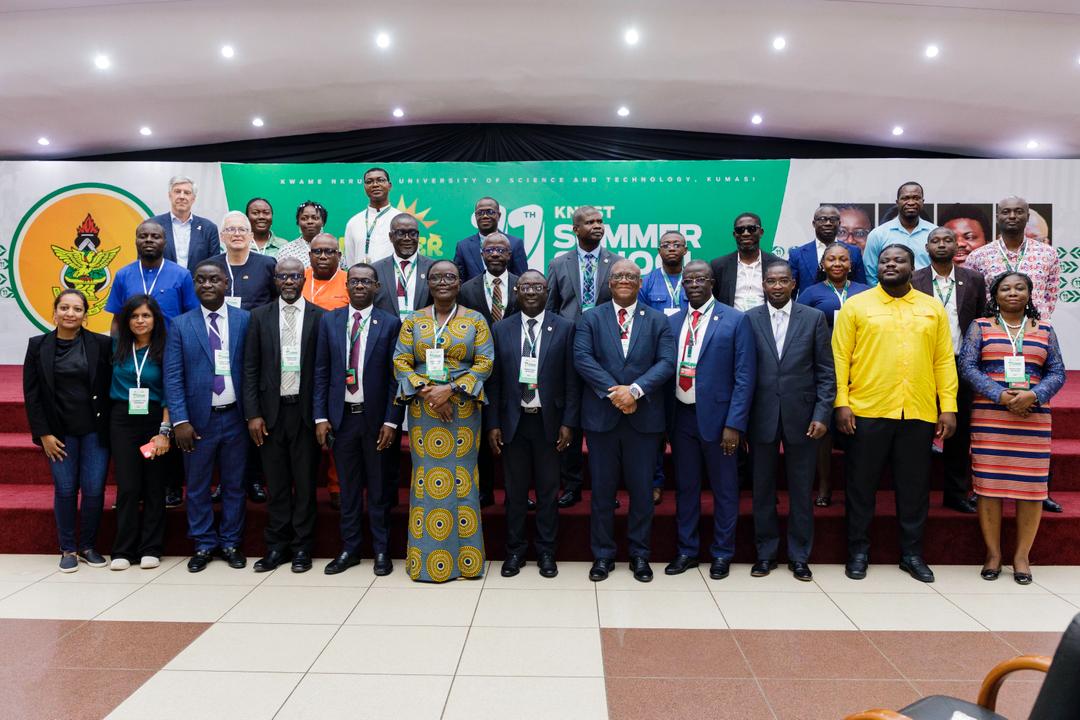Experts have called for stronger collaboration and deliberate national strategies to ensure a holistic adoption of Artificial Intelligence (AI) for Ghana’s development. The call was made at the opening of the 11th Summer School of the Kwame Nkrumah University of Science and Technology (KNUST), Kumasi.
Mr. Darlington Akogo, Chief Executive Officer and Founder of MinoHealth AI Labs and KaraAgro AI, urged universities to integrate AI into all academic programmes and research.
He also called for closer partnerships between industry, academia, and government, citing the example of Ghana’s National AI Strategy Committee.
“We are at the early phase of artificial intelligence, which is improving productivity, reducing production costs, and enhancing energy efficiency and revenue across sectors,” he said. “AI systems are projected to add 15.7 trillion dollars to the global economy by 2030, increase labour productivity by 40 percent in some industries, and automate up to 40 percent of tasks in retail, hospitality, and healthcare.”
Mr. Akogo projected that Ghana’s GDP could increase by 20 billion dollars by 2030 if the country aggressively leverages AI. He proposed the creation of a National AI Fund worth 500 million dollars to support research, innovation, and strategy implementation.
He further reminded academia of its crucial role in national development and urged alignment of research priorities with national goals, noting that “no country develops without science and technology at its core.”
This year’s Summer School, held from 21st to 23rd October 2025 on the theme “Artificial Intelligence in Education,” explores how AI can enhance teaching, improve research, streamline administration, and drive innovation across disciplines.
Prof. Jerry John Kponyo, Dean of the Quality Assurance and Planning Office (QAPO) and Scientific Director of Responsible ArtIficial Intelligence Lab (RAIL), described the theme as timely and forward-looking.
“As a premier science and technology university, KNUST must not only adapt to AI’s transformation but also lead its vision with responsibility and creativity,” he said.
Joining virtually, Dr. Shafika Isaacs, UNESCO Chief of Section for Technology and AI in Education, highlighted the brain drain challenge, noting that over 70,000 skilled professionals leave Africa annually, costing Ghana and Nigeria an estimated 2.3 billion dollars in human capital value since 2020.
She urged African institutions to frame AI in Education (AIED) beyond simplistic assumptions, emphasizing that AI can both bridge and deepen inequalities.
“AI has visible and invisible ways of deepening inequalities, even as it offers efficiency and personalization in learning and research,” she said.
Dr. Isaacs announced that UNESCO has developed AI Competency Frameworks for both teachers and students and called for AI awareness, curriculum reform, capacity building, and robust institutional strategies in higher education.
Vice-Chancellor Prof. Mrs. Rita Akosua Dickson reaffirmed the University’s commitment to preparing students for an AI-driven future.
“Addressing AI in education provides a balanced lens to appreciate its vast opportunities, risks, and ethical applications while shaping the future of knowledge and society,” she said.
She revealed that KNUST has developed a draft AI Strategy Document to guide the integration of AI into teaching, research, administration, and community service. The strategy prioritizes capacity building, ethical governance, innovation, and partnerships to ensure equitable benefits.
Beginning in the 2025/2026 academic year, every KNUST student will take a micro-credential core course in Fundamentals of Artificial Intelligence.
Chairperson of the 2025 Summer School, Prof. Francis Kemausuor, commended the planning committee and management for ensuring the theme was reflected throughout the programme’s design and activities.

















